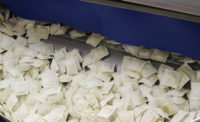Joseph's Gourmet Pasta: Staying true to the product while scaling up production

Meeting the demands of rapid growth as well as maintaining original product quality and safety requirements can be challenging when your products have a reputation for being handmade, artisan items.
Such was the situation for Joseph’s Gourmet Pasta & Sauces, Haverhill, Mass., a producer of specialty pasta and sauce products that are sold to upscale hotels and national restaurant chains.
Joseph’s, which has a reputation for quality as well as innovative custom recipes, has experienced consistently rapid growth year after year since the firm began hand crafting ravioli and sauces in its family-owned Italian bakery in the 1990s. After a few years, when the product line took off, Joseph’s was confronted with the challenges of meeting quantum growth while maintaining the quality flavors and handmade appearance of its products, as well as continuing to offer customized ingredients to a growing number of fine restaurants and foodservice outlets.
“We have a passion for offering the best products and services,” says Joe Faro, CEO and president. “For example, our fillings have unique, made-from-scratch flavors that reflect old-world ingredients and rustic, handmade preparation.”
Yet increasing volumes and the proliferation in recipes were telling Joseph’s that the firm, now a division of Nestlé Suisse, needed to further automate its production processes. At the same time, the need to meet stringent food industry standards was vital to the firm’s reputation and customer expectations.
Evaluating needs
When it comes to cooking, automation can reduce flexibility, particularly in handling many types of ingredients in the same line. Even experienced producers of prepared foods may be reluctant to acquire new technologies or off-the-shelf equipment not readily adaptable to their existing processes. Industry engineers are too familiar with the problems caused by off-the-shelf equipment; not only are there mechanical challenges but the color, texture and flavor of the foods can be adversely affected.In the case of Joseph’s, Faro was determined to invest in customized cooking and refrigeration equipment to meet the company’s quality and flexibility requirements.
“We started out making products by hand, and we wanted to take the same handmade artisan process and automate it,” Faro explains. “We were determined not to lose the handmade appearance and chef-prepared fillings and sauces. So we were extremely careful when considering automation, including the experience of the equipment supplier.”
Bending the equipment, not the process
The equipment line Joseph’s wanted to automate was a roasting line that would include an open-flame roasting, baking, searing and chilling. The items processed on that line would include vegetables and other ingredients for sauces or ravioli fillings. In addition, quick-freeze equipment was needed for ravioli products.Faro conducted his research and evaluation of equipment along with Joseph’s Gourmet Pasta Vice President of Culinary Operations and Manufacturing, David Gillen, who is also a trained chef.
“There's a lot of off-the-shelf equipment available overseas and in Italy, but it couldn't support the rich, rough-chopped, handmade quality we're noted for,” says Gillen. “Rather than change the product to fit the process like some food manufacturers, we wanted to create a process that supports our final product.”
“We did considerable research on the project, and then began to consider suppliers,” Faro explains. “One we were particularly interested in was Unitherm Food Systems in Oklahoma. David Gillen and I paid them a visit and reviewed some of the many equipment designs and cooking systems they had produced for many different food-processing customers.”
Unitherm Food Systems, Bristow, Okla., is recognized for its abilities to meet regulatory as well as engineering requirements, and its capabilities in customizing equipment. The firm describes this as “bending” the design of its cooking and chilling equipment to ensure an optimum fit with the advanced features required on the production lines of many of the food industry’s largest players.
Initially, Joseph’s was interested only in finding a vendor that could supply a continuous grilling oven. However, when Faro and Gillen visited Unitherm and saw custom spiral freezers in production, they were very impressed.
"We examined Unitherm's spiral freezers and saw the robustness and design flexibility of the equipment," adds Gillen. "We felt the equipment would support our process and help us stay true to the product, since our process has put us on the map."
Faro, Gillen and the other project team members sat down with the fabrication engineers and worked out preliminary design, based mainly on the Joseph’s team’s insights.
Although the chilling and freezing process that follows cooking is often considered a fixed quantity by many food manufacturers, the Joseph's team wanted to understand the impact of both chilling and freezing product when airflow and temperature are manipulated. They realized that such details could be as important as cooking to ensure that final product quality is optimized.
“At that point we developed some specifications and talked about how the equipment would operate,” Faro explains. “The supplier team gave its feedback and suggestions. We had some challenges like you do with anything that is custom made. But they stuck with it and we moved through those hurdles very smoothly . . . then set to work on the project.”
After the Joseph’s crew returned to Haverhill, the Unitherm engineers continued to fine tune the design of the new line. The key to making those changes was the collaborative effort between the equipment design engineers and the customer’s engineers and process managers. Among the most noteworthy tools to facilitate that collaboration was a 3D modeling program that Unitherm uses so that every nut and bolt of a system can be portrayed, reviewed and approved or further modified.
“The 3D modeling was a very convenient way to visualize different modifications in great detail,” Faro says. “It enables us to work very conveniently on modifications and approvals, so that we were sure the system would work well for us in the long run.”
About Unitherm
Founded in 1986, Unitherm is known throughout the food processing industry for unique heat transfer systems designed to maximize yields and reduce processing times. Also known for its unique design capabilities including 3D modeling of systems and components, Unitherm works head-to-head with engineers from top-flight companies around the world in developing and building custom cooking systems.For information contact: Unitherm Food Systems, 502 Industrial Road, Bristow, OK 74010; Phone: (918) 367-0197; e-mail: unitherm@unithermfoodsystems.com; or visit www.unithermfoodsystems.com.
Looking for a reprint of this article?
From high-res PDFs to custom plaques, order your copy today!




